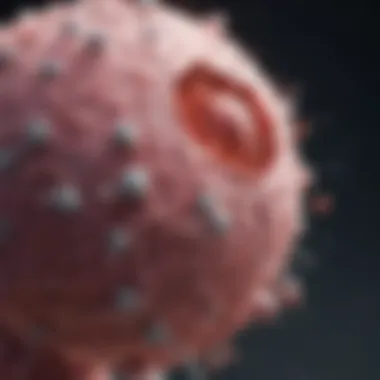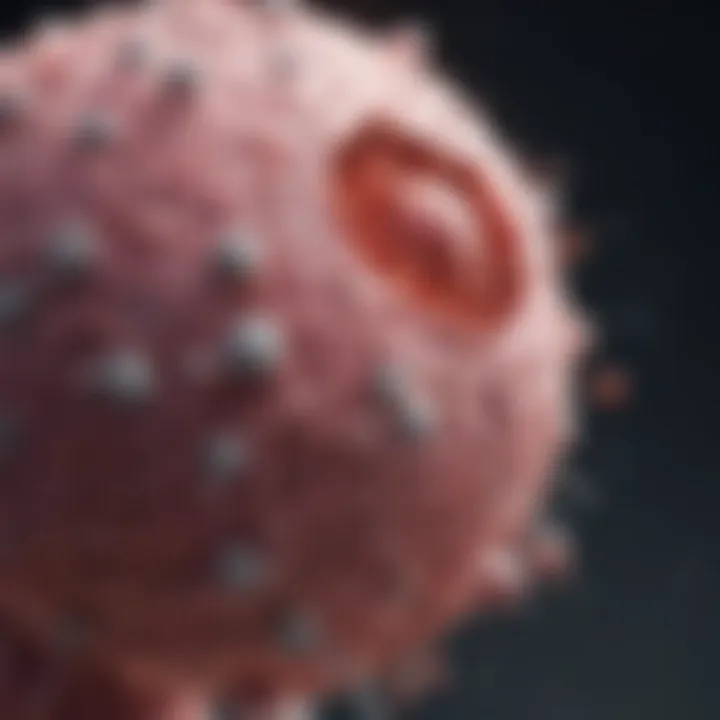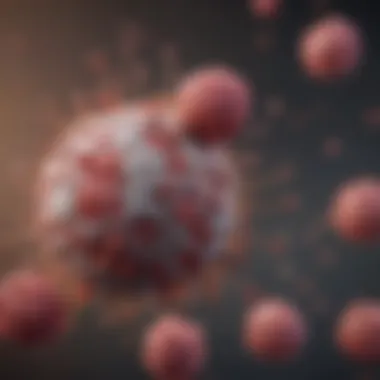Innovative Tumor Vaccines and Their Impact on Cancer Treatment


Intro
Tumor vaccines represent a cutting-edge approach in the field of oncology, aiming to harness the power of the immune system to combat cancer. This article will analyze the advancements in tumor vaccine research, addressing their mechanisms of action and broad implications for cancer treatment. With ongoing clinical trials and innovations, the understanding and utilization of tumor vaccines are rapidly evolving, paving the way for new therapeutic strategies.
Background and Context
Overview of the research topic
The concept of tumor vaccines is rooted in immunotherapy, a branch of treatment that enlists the body's immune system to fight cancer cells. Tumor vaccines can be classified into two main types: preventive and therapeutic. Preventive vaccines, such as those for human papillomavirus (HPV), are designed to prevent cancer from developing, while therapeutic vaccines aim to treat existing tumors by stimulating an immune response. This dual focus emphasizes the innovative nature of tumor vaccines, which seeks to transition cancer from a terminal illness to a manageable one.
Historical significance
The development of tumor vaccines began in earnest during the late 20th century. Early efforts focused on understanding the unique antigens presented by tumor cells and how to effectively elicit an immune response against these antigens. The first FDA-approved therapeutic vaccine, Sipuleucel-T (Provenge), emerged in 2010 for prostate cancer and symbolizes a crucial milestone. It marked the onset of a new era where the immune system is actively engaged in the battle against cancer. Over time, as researchers gain more insights into tumor immunology, the potential for more effective and personalized vaccines continues to expand.
Key Findings and Discussion
Major results of the study
Recent research shows that while tumor vaccines hold significant promise, they also face numerous challenges. One key finding is the variability in patient responses to these vaccines, which complicates their widespread implementation. Certain types of tumor cells can evade detection by the immune system, making them less responsive to vaccine-induced stimulation. This disparity highlights a vital area for continued research.
Detailed analysis of findings
In ongoing clinical trials, new strategies are being explored to enhance the efficacy of tumor vaccines. Some researchers are investigating the combination of tumor vaccines with checkpoint inhibitors, which are drugs that help the immune system recognize and attack cancer cells more effectively. This combination could potentially provide a more comprehensive treatment approach, addressing multiple aspects of tumor immunity.
"The future of cancer treatment may lie in a combination of classic therapies with innovative approaches like tumor vaccination, providing hope for more personalized and effective treatment options."
Continued assessment of patient populations, tailored treatment protocols, and novel adjuvants are being examined to improve vaccine outcomes. Addressing these challenges is crucial, as they pave the way toward more refined therapeutic options and could lead to broader acceptance and application within clinical oncology.
Through this in-depth exploration of tumor vaccines, we aim to unravel their complexities and contributions to cancer treatment, ultimately enhancing the understanding and future integration of these innovations into standard care.
Prologue to Tumor Vaccines
Tumor vaccines represent a promising frontier in cancer treatment, aiming to harness the body's immune system to target and eliminate malignant cells. As cancer becomes a more prevalent concern globally, the exploration of tumor vaccines is crucial for advancing therapeutic options and improving patient outcomes. These vaccines are not merely a replication of traditional vaccination strategies but are designed specifically to educate the immune system about cancer-specific antigens. Understanding this innovation helps in examining how it can change the landscape of oncology.
Definition and Purpose
Tumor vaccines are biological therapies created to trigger an immune response against cancer cells. Unlike standard vaccines that prevent infections, tumor vaccines primarily treat existing cancers. The core purpose of these vaccines is to activate the immune system to recognize and attack tumor cells, which often evade immune detection due to their ability to disguise as normal cells. This distinction is significant; it positions tumor vaccines in a unique category of immunotherapy, where their primary objective is to facilitate an environment where the immune system can effectively combat cancer.
The vaccines may use various components to stimulate an immune response. These can include whole cells, specific proteins known as antigens, or genetic materials such as DNA or RNA that instruct cells to produce tumor antigens. Each approach seeks to boost the immune response and create memory cells for long-term protection against cancer recurrence.
Historical Context
The idea of cancer immunotherapy dates back to the late 19th century, with early pioneers like William Coley using bacteria to provoke immune responses in patients with tumors. This early work laid the foundation for what we now know as tumor vaccines, though significant advances were required before they could be systematically developed.
Modern tumor vaccine research began gaining momentum in the 1980s and 1990s with the discovery of tumor-associated antigens. These breakthroughs prompted the development of various vaccine platforms and initiated several clinical trials. The approval of the sipuleucel-T vaccine for prostate cancer in 2010 marked a significant milestone. It was the first tumor vaccine to receive FDA approval, establishing a precedent for future research and innovation in this field.
Today, researchers are diligently exploring various platforms, including dendritic cell vaccines, peptide-based vaccines, and RNA vaccines. Each of these innovations aims to refine immune responses further and adapt treatment strategies to individual patient needs. As a multidisciplinary area, tumor vaccine research pulls from immunology, genetics, and oncology, enhancing its potential impact on cancer treatment.
Tumor vaccines demonstrate the potential to redefine cancer care by offering customized approaches that align the immune response with the unique aspects of each patient's tumor.
In summary, the exploration of tumor vaccines is not just a scientific endeavor but a necessary step towards transforming how we treat cancer. With ongoing research and technological advancements, they may pave the way for more effective, personalized cancer therapies, addressing a significant need in oncology.
Mechanisms of Action


Understanding the mechanisms of action behind tumor vaccines is crucial for grasping their potential in cancer treatment. These mechanisms dictate how the vaccines elicit immune responses, which are vital for targeting tumors effectively. A deep dive into these processes reveals not only the benefits but also considerations clinicians must account for in treatment protocols.
Immune System Interaction
Tumor vaccines play a pivotal role in engaging the immune system. They stimulate the body to recognize and combat cancer cells. Typically, the immune system distinguishes between self and non-self entities, relying on various cells and communication pathways to respond appropriately. Tumor vaccines can enhance this response by presenting cancer-related antigens, effectively training the immune system to identify and destroy modified cells.
One significant aspect of vaccine immune action is the activation of T-cells, specifically cytotoxic T lymphocytes (CTLs). CTLs have the ability to directly kill cancer cells. When a vaccine introduces specific tumor antigens, these T-cells become primed and proliferate. The result is a more robust immune response, potentially leading to cancer cell destruction.
Moreover, vaccines can also invoke the help of helper T-cells and B-cells, which produce antibodies and further orchestrate the immune attack on tumors. Consequently, the synergy among these elements underlines the necessity of effective vaccine design to optimize interaction with the immune system.
Tumor Antigens
At the core of tumor vaccine strategy is the concept of tumor antigens. These antigens are unique molecules or molecular patterns expressed on the surface of tumor cells. They serve as signals that alert the immune system to the presence of malignancy. The discovery and characterization of these antigens are vital for developing effective tumor vaccines.
Tumor antigens can be classified into several categories:
- Tumor-specific antigens (TSAs): These arise from mutations in tumor DNA and are not found in normal cells, making them ideal targets for the immune system.
- Tumor-associated antigens (TAAs): These are present in both cancerous and normal cells but are overexpressed in tumors. They may elicit a weaker immune response, complicating vaccine development.
Understanding the biology of these antigens is essential. Researchers focus on identifying which antigens provoke strong immune responses. This knowledge guides the design of targeted vaccines and informs clinical decisions.
"The identification of relevant tumor antigens has far-reaching implications for the development of tailored therapies that can elicit robust immune responses."
Types of Tumor Vaccines
Understanding the various types of tumor vaccines is essential as they represent a significant advancement in cancer treatment. These vaccines are primarily designed to enhance the body's immune response against cancer cells. Different types of tumor vaccines have different mechanisms and applications, which contribute to their unique advantages and potential limitations.
Therapeutic vs. Preventive Vaccines
Therapeutic vaccines are developed to treat existing cancer by stimulating the immune system to attack cancer cells. On the other hand, preventive vaccines aim to prevent cancer from developing in the first place. This distinction is critical because it influences the selection of vaccine types for specific patient populations.
Therapeutic vaccines often target specific tumor antigens. These antigens are substances produced by cancer cells and identified by the immune system. Examples include Sipuleucel-T, which is used for prostate cancer. In contrast, preventive vaccines, like the HPV vaccine, work by preventing infections that can lead to cancer.
The choice between therapeutic and preventive vaccines depends on various factors, including the stage of cancer, patient health, and specific tumor characteristics. Efficacy and patient response can also vary, making it crucial to tailor vaccine selection to individual cases.
Dendritic Cell Vaccines
Dendritic cell vaccines harness the power of dendritic cells, which are crucial in initiating immune responses. These cells are first collected from the patient, then loaded with tumor antigens in a laboratory setting. Once they return to the patient, they present those antigens to T-cells. This process stimulates a robust immune response against cancer cells.
One well-known example of dendritic cell vaccine is Sipuleucel-T. It is specifically designed for prostate cancer and is tailored to each patient. The personalized nature of dendritic cell vaccines presents advantages and challenges, particularly in terms of manufacturing and cost.
Peptide-based Vaccines
Peptide-based vaccines consist of short fragments of proteins that correspond to specific tumor antigens. By introducing peptides into the body, these vaccines aim to elicit a targeted immune response. Peptide vaccines can be customized to address different cancers and aim to provide a more focused approach to immunotherapy.
One key advantage of peptide-based vaccines is their potential to be produced efficiently and cost-effectively. However, they might not evoke a sufficiently strong immune response on their own, often necessitating the inclusion of adjuvants to enhance efficacy. Research continues to explore combinations of peptides and other agents to optimize their impact.
DNA Vaccines
DNA vaccines involve introducing genetic material encoding specific tumor antigens directly into the patient. This genetic material instructs the cells to produce the antigen, prompting the immune system to recognize and attack cancer cells. DNA vaccines hold promise due to their potential to generate strong and lasting immune responses.
While still experimental, some DNA vaccines are undergoing clinical trials. For example, a vaccine for melanoma has shown initial promise. The simplicity of production and stability of DNA vaccines makes them an appealing approach in the ongoing search for effective cancer treatments.
RNA Vaccines


RNA vaccines represent a novel approach in tumor immunotherapy. These vaccines utilize messenger RNA (mRNA) that encodes tumor antigens. Once injected into the body, the cells translate this mRNA to produce the antigen, leading to an immune response. The COVID-19 vaccines, such as those developed by Pfizer and Moderna, popularized this technology, showcasing its potential.
In oncology, RNA vaccines are being investigated for various cancers, including melanoma and lung cancer. This approach can induce a potent immune response due to the rapid and robust activation of antigen-presenting cells. While still in developmental stages, RNA vaccines hold a promising future in the fight against cancer.
Vaccines, whether therapeutic or preventive, provide a way for the immune system to recognize and combat cancer effectively. Advances in vaccine technology continue to evolve, ushering in a new era in oncology.
Current Research and Developments
The field of tumor vaccines represents a dynamic and rapidly evolving area of oncology research. Understanding the current research and developments surrounding tumor vaccines is essential to grasping the advancements in cancer treatment. These innovations not only enhance our comprehension of oncological immunotherapy but they also pave the way for new therapeutic strategies.
Clinical Trials
Clinical trials serve as the cornerstone for assessing the efficacy and safety of tumor vaccines. They are systematic investigations that contribute significantly to our understanding of how these vaccines can be utilized effectively in patient care. The process typically begins with early-phase trials focusing on safety and an optimal dosage.
As research progresses, later-phase trials evaluate the vaccines' effectiveness in larger groups. Recent trials have included vaccines like Sipuleucel-T for prostate cancer and ongoing investigations into mRNA vaccines, which have gained attention due to their personalized nature. Enrollment in these studies is crucial, as they allow patients access to cutting-edge treatments while gathering valuable data on diverse demographics.
Moreover, noteworthy aspects of clinical trials include the evaluation of biomarkers. Identifying specific immune responses is essential for determining which patients are most likely to benefit from particular vaccines. Continued efforts in recruitment strategies, such as leveraging technology, have increased participation rates among underrepresented populations, making the trial results more generalizable.
Recent Advances in Technology
The landscape of tumor vaccine development is being transformed by technological advancements. Innovative methodologies and platforms are emerging that streamline vaccine design and production. For instance, the advent of synthetic biology has revolutionized how vaccines are structured.
Key advancements include:
- mRNA technology: The usage of mRNA of vaccines has surged, particularly due to the success seen in the COVID-19 vaccines. Customizing mRNA for tumor antigens allows for an efficient and adaptive approach to vaccine development.
- Viral vector platforms: Using viruses as vectors to deliver tumor antigens has gained traction, offering robust immune responses. This method continues to show promise in creating strong and durable immune memories.
- Nanoparticle-based delivery systems: These systems enhance antigen presentation and improve the localization of the vaccine directly to tumor sites, minimizing systemic toxicity.
Emerging technologies provide new avenues for research and potential breakthroughs in tumor vaccine efficacy.
In summary, current research and developments in tumor vaccines are vital for transforming cancer treatment. With ongoing clinical trials and innovative technological advances, the potential to improve patient outcomes continues to grow in this exciting field.
Challenges in Tumor Vaccine Deployment
The deployment of tumor vaccines represents a significant milestone in the field of oncology, but various challenges persist that hinder their widespread use. These issues touch on efficacy, manufacturing processes, regulatory compliance, and patient access. Dismissing these elements can result in a limited understanding of the practical realities facing researchers, manufacturers, and patients alike. Addressing these challenges is essential not only for the advancement of tumor vaccine technology but also for improving patient outcomes.
Efficacy and Variability in Response
Efficacy remains a central concern when it comes to tumor vaccines. While they aim to provoke a strong immune response against cancer cells, the results can vary significantly from patient to patient. Factors influencing this variability include differences in individual immune systems, tumor characteristics, and genetic predispositions. Researchers are increasingly aware of this challenge, and ongoing studies look to identify biomarkers that could help predict which patients are more likely to respond positively to specific vaccines. This personalization is crucial; without it, many patients may be subjected to treatments with minimal likelihood of benefit.
Manufacturing and Production Issues
The manufacturing of tumor vaccines presents its own set of barriers. Vaccine production often requires precise protocols and stringent quality controls. The complexity of extracting and processing tumor antigens can lead to inconsistencies in product quality. A well-documented case is that of Dendritic cell vaccines, where the process involves isolating a patient’s immune cells and then modifying them before reintroduction into the body. Scale-up can become a bottleneck, creating delays and increased costs. Ensuring a consistent supply of effective vaccines poses an ongoing challenge that the industry must tackle to ensure patient access and safety.
Regulatory Hurdles
Navigating the regulatory landscape is another significant challenge for tumor vaccines. Regulatory bodies like the U.S. Food and Drug Administration (FDA) and the European Medicines Agency (EMA) have set rigorous standards to ensure the safety and efficacy of cancer therapies. While these regulations are essential, they can also slow down the approval process. New tumor vaccines must undergo extensive trials, which are costly and time-consuming. The lengthy review timelines can delay access for patients in critical need of innovative therapies. As such, an ongoing dialogue between developers and regulatory agencies will be necessary to streamline processes without compromising safety or efficacy.
"As tumor vaccines continue to develop, understanding the challenges of efficacy, production, and regulation will pave the way for more successful implementation in clinical practice."
Future Directions
The exploration of tumor vaccines is entering an exciting phase, with numerous innovations paving the way for future directions in oncology. While tumor vaccines already show promise in eliciting immune responses against cancer, their potential is far from fully realized. This section focuses on two central themes that signify the trajectory of research and application in this field: combination therapies and personalized vaccination protocols. Both are vital as they not only seek to enhance the effectiveness of tumor vaccines but also address the complexities of individual patient responses.
Combination Therapies


Combination therapies involve the integration of tumor vaccines with other treatment modalities, such as chemotherapy, radiation, or targeted therapy. This approach aims to create a more comprehensive treatment strategy by leveraging the synergistic effects of different therapeutic agents.
- Enhanced Efficacy: Utilizing tumor vaccines alongside traditional therapies can improve overall treatment outcomes. The vaccine can prime the immune system, making cancer cells more susceptible to other treatments.
- Diverse Mechanisms: Combining therapies allows for the activation of various immune pathways. While a vaccine stimulates an immune response, other treatments can target the tumor directly or modify the tumor microenvironment, creating an optimized scenario for cancer control.
- Ongoing Clinical Trials: Several clinical trials are currently assessing the efficacy of various combinations. For example, integrating the immune checkpoint inhibitors with tumor vaccines represents a significant area of interest due to their potential to increase T-cell activity against tumors.
- Challenges: This strategy also faces challenges. Understanding the timing between different therapies and managing potential adverse effects requires thorough research. Balancing these therapies optimally will require in-depth studies to determine effective protocols.
"Combining tumor vaccines with established therapeutic methods holds the potential to revolutionize cancer treatment paradigms."
Personalized Vaccination Protocols
Personalized vaccination protocols represent a significant advancement in the field of oncology. These protocols take into consideration the unique characteristics of each patient's tumor, enhancing the precision of immune targeting.
- Tailored Approaches: By analyzing the specific tumor antigens present in a patient's cancer, researchers can design vaccines that are more likely to provoke a robust immune response. This customization reflects an understanding that tumors can vary significantly between individuals.
- Benefits: Personalized vaccines may lead to improved efficacy, reduced side effects, and better overall patient outcomes. This strategy focuses on harnessing the individual's immune system more effectively against their unique tumor profile.
- Technological Innovations: Advances in genomic sequencing and bioinformatics have made it possible to identify personalized antigens. As researchers continue to refine methods for antigen identification, the feasibility of personalized tumor vaccines increases.
- Real-world Implementation: The challenge remains to implement these protocols in clinical settings effectively. The cost of personalized treatments and the training required for healthcare professionals are critical aspects that need to be addressed.
Understanding these future directions in tumor vaccines is essential. Ongoing research must address these complexities, ensuring that innovations in combination therapies and personalized protocols translate into viable options for cancer patients. As our knowledge broadens, the implications for effective cancer treatment become increasingly pronounced.
Ethical Considerations
The evolving landscape of oncology, particularly in the realm of tumor vaccines, prompts significant ethical discussions. These considerations are vital as they influence both the development and implementation of these innovative treatments. Addressing ethical issues ensures that patients are treated with respect and that research advances in a morally responsible manner.
In the context of tumor vaccines, ethical considerations encompass a range of specific elements. Among them, the principle of informed consent stands out prominently. Patients should be fully aware of the nature of the treatments they are undergoing, including potential risks and benefits. This ensures that decisions made about participation in clinical trials or therapeutic interventions are based on comprehensive understanding and personal choice.
Furthermore, another important aspect is the equity in access to treatments. As tumor vaccines offer promising avenues for cancer treatment, it is crucial to ensure that these advancements do not exacerbate existing disparities in healthcare access. The allocation of resources and availability of these therapeutics should be equitable, regardless of socioeconomic status or geographic location. Such equity helps to foster trust in medical advancements and supports overall public health goals.
These ethical considerations not only reinforce the necessity for responsible practices but also align with broader humanitarian principles, ultimately enhancing the integrity and effectiveness of tumor vaccine research and application. > "Ethics in clinical research must balance scientific advancement with respect for patient rights."
Together, these factors underscore the importance of thoughtful ethical deliberation as part of the ongoing evolution of cancer treatment options. Ensuring informed consent and promoting equity are essential steps that facilitate trust and efficacy in the adoption of tumor vaccine innovations.
Informed Consent
Informed consent is a foundational ethical principle in medical practice and research. It requires that participants are provided with all necessary information before agreeing to any treatment or involvement in a study. In the context of tumor vaccines, this means explaining the nature of the vaccine, potential side effects, and the reasoning behind using such a treatment. Patients should be given an opportunity to ask questions and voice concerns. This empowerment fosters a collaborative atmosphere between patients and healthcare providers, encouraging shared decision-making.
The complexity of cancer treatments can be daunting. Thus, the information provided must be clear and comprehensible. It is critical that healthcare professionals actively ensure that patients understand what they are consenting to, not just in a superficial manner, but in a way that students or non-specialists can grasp. The intent is not merely to fulfill a legal obligation but to uphold the dignity of individuals involved in the clinical process.
Equity in Access to Treatments
Equity in access to treatments addresses the disparities that exist in healthcare systems. With tumor vaccines showing potential to change cancer treatment's trajectory, it is crucial to ensure that all patients have the same opportunities to benefit from such innovations. Barriers to access can include financial limitations, geographic location, and healthcare infrastructure gaps.
This ethical challenge prompts a collective responsibility among stakeholders, including governments, pharmaceutical companies, and healthcare providers, to devise strategies that enhance accessibility. Some approaches could include:
- Subsidized programs for low-income patients
- Telehealth services to reach remote areas
- Community outreach to educate underserved populations about available options
Ensuring equitable access contributes not only to better individual outcomes but also strengthens public health overall. Inherent in the success of tumor vaccines is the potential they hold to unite various demographic groups in the fight against cancer. By addressing these ethical considerations, the journey toward successful treatment can be more inclusive and impactful.
The End
The conclusion section of this article highlights the significance of tumor vaccines within the field of oncology. Tumor vaccines stand as a promising advance in cancer therapy, reshaping traditional treatment approaches. Understanding the innovations in tumor vaccines enhances grasp of how these therapies can uniquely benefit patients and contribute to long-term cancer control.
Summary of Findings
The exploration of tumor vaccines reveals their potential to engage the immune system against tumors. From therapeutic to preventive vaccines, the variations underscore the complexity and versatility of these treatments. Studies show notable advancements in technology and methodologies, improving efficacy rates and patient outcomes. The article has emphasized:
- The diverse types of tumor vaccines available today, each with distinct mechanisms.
- Current challenges in efficacy and production that need addressing.
- The ongoing research and clinical trials focused on optimizing vaccine delivery and patient response.
These findings suggest a collective effort is underway to refine tumor vaccines and integrate them into standard cancer care, promising a new horizon in personalized treatment strategies.
Implications for Future Research
Future research directions are critical as the landscape of tumor vaccines evolves. Understanding their full potential requires:
- In-depth exploration of combination therapies that harness the strengths of both tumor vaccines and other treatment modalities, such as chemotherapy and immune checkpoint inhibitors.
- Focus on personalized medicine. Tailoring tumor vaccines to individuals based on genetic profiles can enhance efficacy and reduce variability in responses.
- Addressing ethical considerations. Research must also consider how to ensure equitable access to tumor vaccine therapies across different demographics.
As these avenues for research are explored, it is likely that the role of tumor vaccines in oncology will expand, ultimately improving patient outcomes and reshaping oncological practices for the better.







